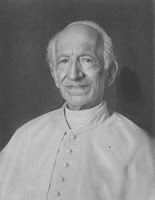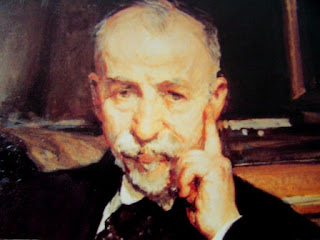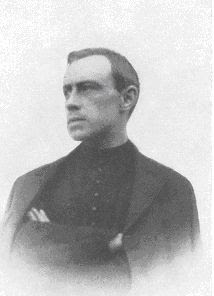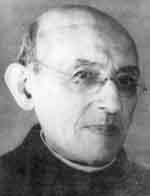The Historical Context
If one were pressed to isolate a single trend within the contemporary Catholic theological milieu whose powerful impact and enduring presence has most affected Catholicism from the top of the episcopal hierarchy down to the anonymous layperson in the pew, one would most certainly conclude that the ressourcement movement of twentieth century Catholic theology would be the only viable and worthy candidate for isolation. What began as a loose trend among a few Catholic scholars in the early twentieth century to rediscover the authentic thought of Thomas Aquinas burgeoned into a sweeping ecclesial tour de force emanating renewal and reform throughout academia and the Catholic Church itself. Indeed, the current shape of Catholic theology, spirituality and ecclesial perspective is by and large a direct product of the ressourcement movement.
‘Ressourcement’ is a difficult word to define. There is no adequate English equivalent to this French neologism. The spirit of the movement, coupled with the etymology of the French, has led most Anglophone scholars to simply transliterate the term as ‘return to the sources’ or, more awkwardly, ‘renewal through return to sources’. True, it’s always nice to return to our roots, but to which roots shall we return? Which sources shall be privileged? In short, the loosely-connected thinkers whose work ushered in the ressourcement movement sought to return to the writings of the early church, that is, to the works and ideas of the early Fathers of Christianity—everyone from Clement of Alexandria to Bede in the West, and everyone from Ignatius to John Damascene in the East. The progenitors of ressourcement believed that a return to the writings of these Christians would not only reestablish in the Catholic consciousness a sense of continuity and development of the treasury of faith across two millennia, but also renew the very face of Catholic theology, which had virtually ossified due to the Scholastic manual tradition that had been entrenched in Catholic universities and seminaries since the eighteenth century. Thus, their theology was not merely an exercise in Patristic study, but a reading of the Fathers as both historical figures (contextualized study) and as contemporaries (constructive implication).
It would be helpful to sketch the historical context in which the ressourcement ori ginated before moving to a discussion of some of its specific emissaries. Catholic theology in the early twentieth century was indelibly marked, or so it seemed, by a fierce allegiance to the commentary tradition on the theology and philosophy of Thomas Aquinas. This tradition, dubbed Neo-Scholasticism, sprouted by means of the concerted studies and commentaries on Aquinas by Thomas Cajetan in the sixteenth century. It took definitive shape through the writings of Francisco Suarez, Domingo Bañez and John of St. Thomas, and was all but ubiquitous in Catholic thought by the start of the twentieth century. The preceding nineteenth century saw a few anomalies amidst the dominant neo-Scholastic party, in particular the historically and quasi-ecumenically conscious Tübingen school (especially Johann Sebastian Drey and Johann Adam Möhler), John Henry Newman and Matthias Scheeben, a Thomist who exhibited little allergy to the writings of the early Church, especially those of the Eastern Fathers. But exceptions, of course, did not alter the rule. This is not to say that neo-Scholasticism was a great monolith in terms of every theological opinion, but in terms of method, scope and form the tradition was rather uniform.
ginated before moving to a discussion of some of its specific emissaries. Catholic theology in the early twentieth century was indelibly marked, or so it seemed, by a fierce allegiance to the commentary tradition on the theology and philosophy of Thomas Aquinas. This tradition, dubbed Neo-Scholasticism, sprouted by means of the concerted studies and commentaries on Aquinas by Thomas Cajetan in the sixteenth century. It took definitive shape through the writings of Francisco Suarez, Domingo Bañez and John of St. Thomas, and was all but ubiquitous in Catholic thought by the start of the twentieth century. The preceding nineteenth century saw a few anomalies amidst the dominant neo-Scholastic party, in particular the historically and quasi-ecumenically conscious Tübingen school (especially Johann Sebastian Drey and Johann Adam Möhler), John Henry Newman and Matthias Scheeben, a Thomist who exhibited little allergy to the writings of the early Church, especially those of the Eastern Fathers. But exceptions, of course, did not alter the rule. This is not to say that neo-Scholasticism was a great monolith in terms of every theological opinion, but in terms of method, scope and form the tradition was rather uniform.
What most characterized neo-Scholasticism was the assumption that theology proceeds in deductiv e fashion, beginning with absolute first principles followed by theological conclusions of varying degrees of certainty therein deduced. Aristotelian logic, especially as outlined in the Prior and Posterior Analytics and the ‘timeless’ quality of Aristotelian science were paradigmatic to the neo-Scholastic method. Thus, when practitioners of neo-Scholasticism were not producing dogmatic handbooks chock full of theological deductions arranged by topic (e.g. De Deo Uno, De Deo Trino, De natura humana), they were penning commentaries on either Aquinas’ works or other commentaries on Aquinas’ works. Questions of historicity and hermeneutics were not important to the neo-Scholastic methodology which, by assuming it was simply perpetuating the spirit of Aquinas, placed its confidence in what it ultimately believed to be a watertight scientific system. Hence, the stamina of such a uniform theological method across a number of centuries.
e fashion, beginning with absolute first principles followed by theological conclusions of varying degrees of certainty therein deduced. Aristotelian logic, especially as outlined in the Prior and Posterior Analytics and the ‘timeless’ quality of Aristotelian science were paradigmatic to the neo-Scholastic method. Thus, when practitioners of neo-Scholasticism were not producing dogmatic handbooks chock full of theological deductions arranged by topic (e.g. De Deo Uno, De Deo Trino, De natura humana), they were penning commentaries on either Aquinas’ works or other commentaries on Aquinas’ works. Questions of historicity and hermeneutics were not important to the neo-Scholastic methodology which, by assuming it was simply perpetuating the spirit of Aquinas, placed its confidence in what it ultimately believed to be a watertight scientific system. Hence, the stamina of such a uniform theological method across a number of centuries.
This is not to suggest that the neo-Scholastics were collectively incognizant of the challenge of modern philosophy, which all but exiled Aristotle’s epistemological starting point with the knowledge of being. Indeed, the neo-Scholastics were quite aware of post-Cartesian trends in philosophy, as well as their Protestant theological interlocutors. However, the neo-Scholastics took for granted a spontaneous certainty of sense experience while trusting in the accuracy of cognitive appropriation of sense data. Add to this the self-evident presumption that the first thing known through cognition is being, the result is a philosophical system that does not take the cogito seriously, let alone as a valid departure point in philosophy. All this despite Descartes’ rather liberal partaking of Scholastic vocabulary and concepts. Neo-Scholasticism conceived of post-Cartesian philosophy as inherently incapable of handling the theological problems it inherited and bequeathed. Without establishing the distinct ordo naturae, it was thought that modern philosophy could not handle the important question of grace and nature. Without a proper metaphysics, it was thought that post-Cartesian philosophy was doomed to nihilism or immanentism due to its distrust of sense experience and rejection of a mediate grasp of being through cognition and judgment.
 Up until the late nineteenth century, the regal presence of Neo-Scholasticism was relatively circumstantial. However, with Pope Leo XIII’s promulgation of Aeterni Patris in 1879, the philosophy of Aquinas—as interpreted solely by neo-Scholasticism—became the standard philosophy and theology of Catholic seminarian formation. Theological works that took a historical, developmental or ‘Cartesian’ approach to reason and faith were gradually removed and replaced by the dogmatic manuals of the neo-Scholastics. Solidifying the papal decree within the greater breadth of academia were Matteo Liberatore and Joseph Kleutgen, whose theological and philosophical manuals embodied the desire of Leo XIII for Catholic theology.
Up until the late nineteenth century, the regal presence of Neo-Scholasticism was relatively circumstantial. However, with Pope Leo XIII’s promulgation of Aeterni Patris in 1879, the philosophy of Aquinas—as interpreted solely by neo-Scholasticism—became the standard philosophy and theology of Catholic seminarian formation. Theological works that took a historical, developmental or ‘Cartesian’ approach to reason and faith were gradually removed and replaced by the dogmatic manuals of the neo-Scholastics. Solidifying the papal decree within the greater breadth of academia were Matteo Liberatore and Joseph Kleutgen, whose theological and philosophical manuals embodied the desire of Leo XIII for Catholic theology.
Despite the papal prerogative, the shortsightedness of Aeterni Patris became evident to the Catholic realm of theology less than two decades after its promulgation. In a theological climate virtually dominated neo-Scholasticism, Catholic thinkers such as Maurice Blondel (1861-1949), Pierre Rousselot (1878-1915) and Joseph Maréchal (1878-1944) began to question the philosophical aptitude of their manualist counterparts.Blondel, trained in philosophy in the secular French university system, did not find neo-Scholasticism amenable to Catholicism’s engagement with the modern world. He detected in the manual tradition a more Aristotelian than Augustinian spirit that resulted in a radical dichotomy between the world and God—between the natural and the supernatural—which actually aided the efforts of European secularists and their quest to banish religion from the public sphere. In his monumental L’Action (1893), Blondel attempted to illumine the philosophical and anthropological foundations of the volitional desire in humanity for the potential, but not necessary, action of the supernatural, that is, beyond the natural.
a theological climate virtually dominated neo-Scholasticism, Catholic thinkers such as Maurice Blondel (1861-1949), Pierre Rousselot (1878-1915) and Joseph Maréchal (1878-1944) began to question the philosophical aptitude of their manualist counterparts.Blondel, trained in philosophy in the secular French university system, did not find neo-Scholasticism amenable to Catholicism’s engagement with the modern world. He detected in the manual tradition a more Aristotelian than Augustinian spirit that resulted in a radical dichotomy between the world and God—between the natural and the supernatural—which actually aided the efforts of European secularists and their quest to banish religion from the public sphere. In his monumental L’Action (1893), Blondel attempted to illumine the philosophical and anthropological foundations of the volitional desire in humanity for the potential, but not necessary, action of the supernatural, that is, beyond the natural.
R ousselot and Maréchal were both priests, academically trained in the neo-Scholastic way. However, breaking with their predecessors, Rousselot and Maréchal took modern philosophy seriously. Rousselot, influenced by the anti-‘intellectualism’ of Blondel and Henri Bergson, bypassed the neo-Scholastic commentaries on Aquinas and turned to the actual writings of Aquinas himself. In his short career, Rousselot produced two treatises that would change the entire course of Thomistic studies in the 20th century: L’Intellectualism de Saint Thomas (1924) and Pour L’Histoire du probléme de l’amour au moyen-âge (1908). Rousselot sought to recover the historical Aquinas’ epistemology, situating his ideas within their historical context and medieval debate, rather than portraying Aquinas’ ideas through the medium of the 700 year commentary tradition of neo-Scholasticism.
ousselot and Maréchal were both priests, academically trained in the neo-Scholastic way. However, breaking with their predecessors, Rousselot and Maréchal took modern philosophy seriously. Rousselot, influenced by the anti-‘intellectualism’ of Blondel and Henri Bergson, bypassed the neo-Scholastic commentaries on Aquinas and turned to the actual writings of Aquinas himself. In his short career, Rousselot produced two treatises that would change the entire course of Thomistic studies in the 20th century: L’Intellectualism de Saint Thomas (1924) and Pour L’Histoire du probléme de l’amour au moyen-âge (1908). Rousselot sought to recover the historical Aquinas’ epistemology, situating his ideas within their historical context and medieval debate, rather than portraying Aquinas’ ideas through the medium of the 700 year commentary tradition of neo-Scholasticism.
Maréchal, though desirous of recovering the Aquinas of history, also took the t rajectories of modern philosophy seriously. In particular, he perceived Kant’s critique of pure reason as a formidable and unassailable challenge to theology. In light of the Kantian problematic, Maréchal detected a fundamental need to map out the necessary conditions for the human knowledge of divine revelation in Thomistic terms. His voluminous notes, collated as Le Point de départ de la métaphysique (1944-1949) paved the way for a careful consideration of Aquinas in historical context while adapting Thomistic epistemology to meet the demands of modern philosophical projects. Maréchal’s work became the basis for the later movement known as ‘transcendental Thomism’ whose main proponents were Karl Rahner and Bernard Lonergan.
rajectories of modern philosophy seriously. In particular, he perceived Kant’s critique of pure reason as a formidable and unassailable challenge to theology. In light of the Kantian problematic, Maréchal detected a fundamental need to map out the necessary conditions for the human knowledge of divine revelation in Thomistic terms. His voluminous notes, collated as Le Point de départ de la métaphysique (1944-1949) paved the way for a careful consideration of Aquinas in historical context while adapting Thomistic epistemology to meet the demands of modern philosophical projects. Maréchal’s work became the basis for the later movement known as ‘transcendental Thomism’ whose main proponents were Karl Rahner and Bernard Lonergan.
Despite the efforts of Blondel, Rousselot and Maréchal on the academic and public levels, the magisterial rule as laid out in Aeterni Patris still held sway in Catholic theology and philosophy. Neo-Scholasticism remained strong in the early 20th century, due largely to the political and polemical moves of prominent theologians such as Reginald Garrigou-Lagrange and M.-Michael Labourdette, both of whom had the constant ear of the pope and Roman Curia. However, a young Jesuit theologian in France was slyly slipping into his otherwise neo-Scholastic curriculum the writings of Origen, Augustine, Aquinas, Blondel, Rousselot and Maréchal. What began as tangential, idiosyncratic leisure reading soon became the defining quality of Henri de Lubac’s theological formation and shortly thereafter, by extension, the pivotal impulse for reform—ressourcement — from within the very heart of the Catholic Church.
SUGGESTED READING
Gerald A. McCool, The Search for a Unitary Method: Nineteenth-Century Scholasticism (New York: Fordham University Press, 1989).
idem, From Unity to Pluralism: The Internal Evolution of Thomism (New York: Fordham University Press, 1992).
Stephen J. Duffy, The Graced Horizon: Nature and Grace in Modern Catholic Thought (Collegeville, MN: Liturgical Press, 1992), 50-65.
Pierre Rousselot, The Intellectualism of Saint Thomas, trans. James E. O’Mahony (New York: Sheed and Ward, 1935).
Maurice Blondel, Action (1893): Essay on a Critique of Life and a Science of Practice, trans. Oliva Blanchette (Notre Dame, IN: University of Notre Dame Press, 1984).
Joseph Maréchal, A Maréchal Reader, trans. and ed. Joseph Donceel (New York: Herder and Herder, 1970).












